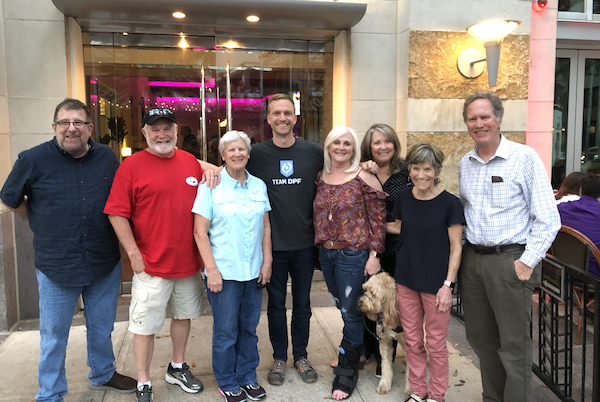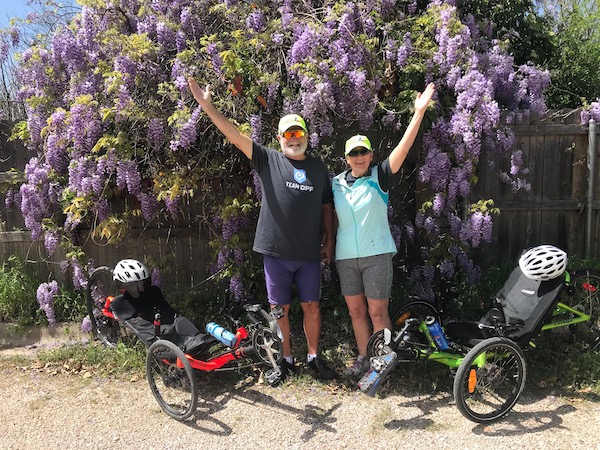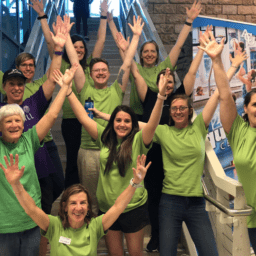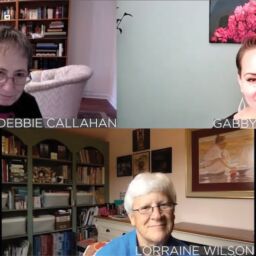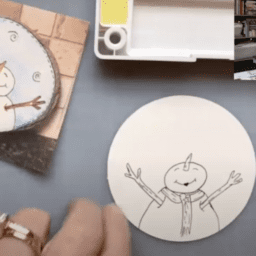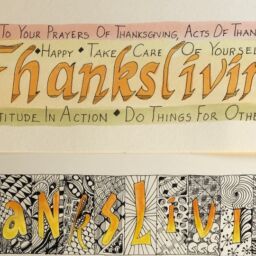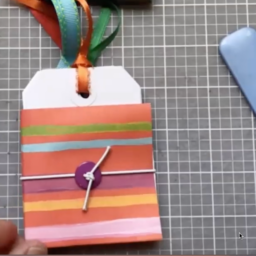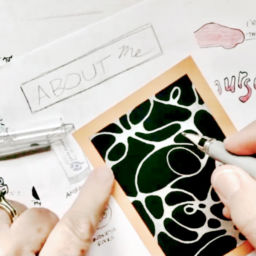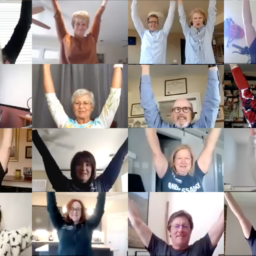Written by Lorraine Wilson, Davis Phinney Foundation Ambassador
Who’s on Your Team?
Those of us with Parkinson’s, and those who support us, are well aware that it is a progressive, neurodegenerative disease that presents with both motor and non-motor symptoms. Many of these symptoms make us appear different from others in our day-to-day lives and may lead to feelings of reluctance to go out in public. As a newly diagnosed person with Parkinson’s, I quickly learned the value of a support team.
I had teachers, coaches, mentors, and peers who encouraged me when I was young. They taught me a lot about living and working in community. I learned as a young adult to strategically invest in social capital to benefit others and myself. In fact, my collegiate network of friends, and now colleagues, have been a constant source of encouragement over decades. The first people I told about my Parkinson’s diagnosis, after my spouse, were my “in-network” friends. Why did I feel comfortable telling them?
Support Team Groundwork
The three factors that lead me to invest in others or expect them to invest in me are:
- Common ground
- Knowledge
- Trust
I knew my family and friends would support me after my diagnosis just as they had before it, but I truly felt less isolated as a person with Parkinson’s the first time I met another person living with it. “You really get it!” flashed through my mind over and over while speaking to this person, and we found ourselves on common ground.
Gaining knowledge about medications, exercise options, and the local support group contributed to improving my health while building my community. My quality of life had been good pre-diagnosis and became even better by connecting with people who had expert knowledge about Parkinson’s. Also, increasing my exercise options by participating in an exercise study that mitigated the negative impact of my motor symptoms, increased my social and emotional wellness and reduced the negative effects of stress and perceived stigma.
I read about the benefits of joining a support group early on, but I was skeptical. For one thing, it bothered me as a newly diagnosed person to be in the same room with people with more advanced Parkinson’s. I was not comfortable with the canes, walkers, and wheelchairs. I learned later that this was not an uncommon concern. What I did not expect, though, was the shared sense of identity offered by these persons as I grew to know and respect them. Our physical symptoms may not have been the same at any given moment, but we all worked to be in the best possible shape for our Parkinson’s stage. There was much knowledge to be shared and trust was built over time as we met at the support group meetings, smaller peer group lunches or coffee times, and in exercise or art sessions. I now find myself leading the local support group and enjoying the opportunity that brings to encourage the “regulars” and the “newbies.”
Support Team Success
You’ve probably heard the phrase “there is no I in TEAM.” That works well in the world of athletics where players need to work as a team to reach a championship. There is, however, a good reason for there to be an I in T.E.A.M. when the overriding goal is to surround an individual who needs help due to chronic illness, anxiety, depression, post-traumatic stress disorder, etc. At least one person from each category in T.E.A.M. is a good place to start.
T: Therapists, particularly in physical and occupational therapy, contribute assistance during many phases of living with Parkinson’s. Others may include persons trained in art, music, or dance therapy.
E: Experts in nutrition and exercise offer help in living well day-to-day.
A: Allies are, simply stated, people who are on your side and want to protect you as much as possible. They may be family members, close friends, and colleagues.
M: Medical personnel with special training in movement disorders are invaluable in selecting what will help the most in managing your Parkinson’s. This may include your family doctor, a neurologist, a movement disorder specialist, and a surgical team if at some point you opt for treatments that require surgery.
Please tap into opportunities that come your way to build a T.E.A.M. within your Parkinson’s network. You will be well served and happier for it.
Want More Practical Articles Like This?
Much more can be found in our Every Victory Counts® manual. It’s packed with up-to-date information about everything Parkinson’s, plus an expanded worksheets and resources section to help you put what you’ve learned into action. Request your copy of the Every Victory Counts manual by clicking the button below.
Thank you to our 2020 Peak Partners, Amneal and Kyowa Kirin, with special support from Adamas, for helping us
make printing, distributing, and shipping the Every Victory Counts manual possible.


